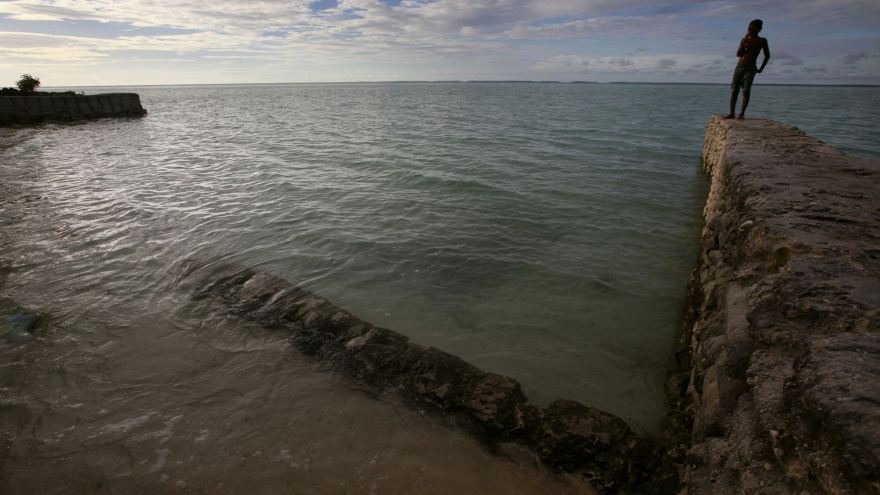Climate Refugees: An Entire Island Nation Is Preparing to Evacuate to Fiji Before They Sink Into the Pacific
ENVIRONMENT, 7 Jul 2014
Gwynn Guilford, Quartz – TRANSCEND Media Service

Sea walls like these haven’t been enough to stop the steady rise of the seas around Kiribati. Reuters/David Gray
This has to be the weirdest business deal of the week: The Church of England just sold a chunk of forest-covered land on the Fijian island Vanau Levu for $8.8 million to the government of the Pacific island nation of Kiribati. For the moment, Kiribati plans to use its 20-square-kilometer (7.7-square-mile) plot for agriculture and fish farming. But the investment is really a fallback for its 103,000 residents—a place to live if they must leave their home island.
“We would hope not to put everyone on [this] one piece of land, but if it became absolutely necessary, yes, we could do it,” president Anote Tong told the Associated Press, via the Guardian. Tong is awaiting parliamentary approval of the land purchase before clearing that possibility formally with Fiji’s officials.
Why is Tong preparing for a mass defection to an island 2,000 kilometers away?
The seas around Kiribati’s 32 atolls (ring-shaped coral reefs) are rising 1.2 centimeters (0.5 inches) a year—about four times faster than the global average—thanks to the flux of ocean currents. Some experts think that by 2100, the country will have disappeared beneath the waves. That may be optimistic; some residents expect the sea to subsume their homes within 20 or 30 years.
That’s a grim outlook. But the present isn’t exactly peachy either. With its atolls no more than about three meters (9.8 feet) above sea level, Kiribati currently faces periodic food shortages thanks largely to rising tides. Not only does rampant flooding caused by spring tides destroy homes and businesses, but it also increases the salt content of the soil, ravaging crops and tainting fresh water sources. On top of that, coral bleaching caused by the heating of ocean waters has decimated the marine ecosystems built off those reefs, driving fish away. That’s why one of the short-term advantages of the purchase of the Vanau Levu plot is that it should help secure food supply for Kiribati’s residents.
The situation has gotten so bad that some Kiribati residents have tried to claim asylum in New Zealand, arguing that the burning of fossil fuels by industrial countries is a form of persecution against people vulnerable to its consequences. So far, courts have dismissed these arguments for emigration, which may be why the Kiribati government is opting for the investment route instead.
The people of Kiribati might have been the first to make these claims, but they probably won’t be the last; recent estimates predict that the number of “climate refugees”—people displaced by the effects of global warming—will reach 700 million by 2050.
DISCLAIMER: The statements, views and opinions expressed in pieces republished here are solely those of the authors and do not necessarily represent those of TMS. In accordance with title 17 U.S.C. section 107, this material is distributed without profit to those who have expressed a prior interest in receiving the included information for research and educational purposes. TMS has no affiliation whatsoever with the originator of this article nor is TMS endorsed or sponsored by the originator. “GO TO ORIGINAL” links are provided as a convenience to our readers and allow for verification of authenticity. However, as originating pages are often updated by their originating host sites, the versions posted may not match the versions our readers view when clicking the “GO TO ORIGINAL” links. This site contains copyrighted material the use of which has not always been specifically authorized by the copyright owner. We are making such material available in our efforts to advance understanding of environmental, political, human rights, economic, democracy, scientific, and social justice issues, etc. We believe this constitutes a ‘fair use’ of any such copyrighted material as provided for in section 107 of the US Copyright Law. In accordance with Title 17 U.S.C. Section 107, the material on this site is distributed without profit to those who have expressed a prior interest in receiving the included information for research and educational purposes. For more information go to: http://www.law.cornell.edu/uscode/17/107.shtml. If you wish to use copyrighted material from this site for purposes of your own that go beyond ‘fair use’, you must obtain permission from the copyright owner.